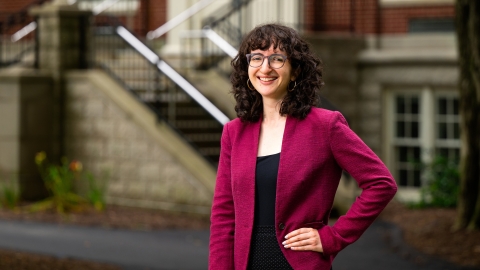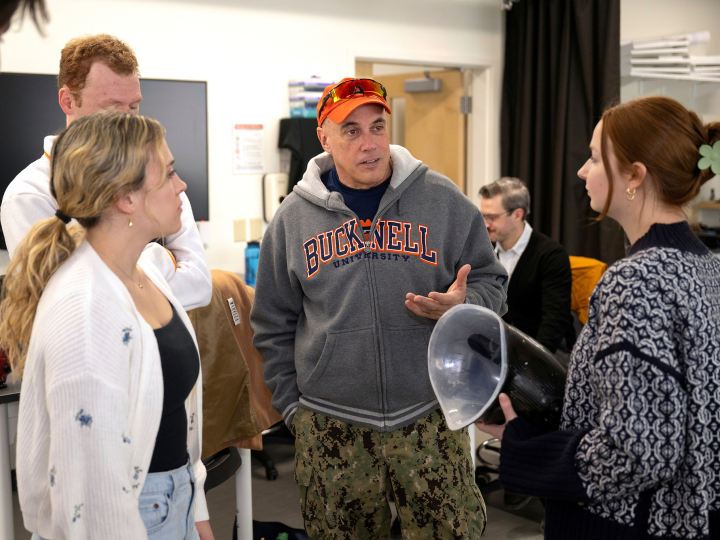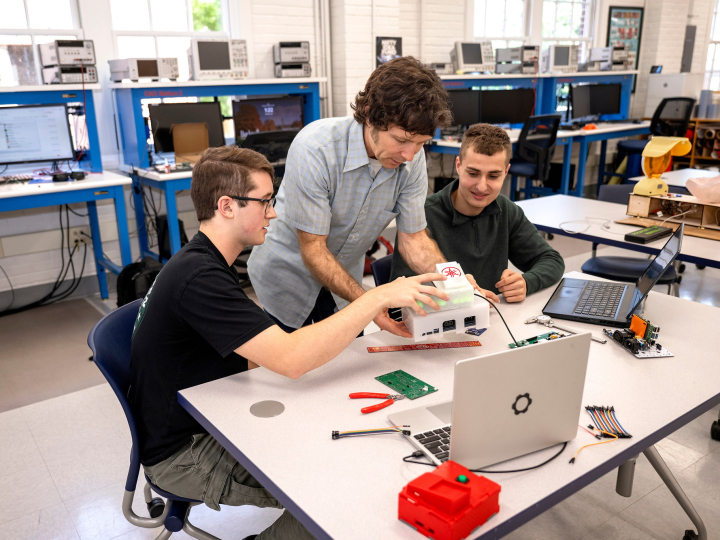
Bucknell Professor Awarded Prestigious NSF CAREER Grant to Expand Research Demystifying Engineering Intuition
July 24, 2025
Professor Elif Miskioǧlu, chemical engineering, was awarded the NSF grant to continue her research on the use of intuition in engineering practice. Photo by James T. Giffen, Marketing & Communications
Bucknell University Professor Elif Miskioǧlu, chemical engineering, has received a National Science Foundation (NSF) Faculty Early Career Development (CAREER) Award — the agency's most prestigious and competitive grant award. The five-year, $650,000 grant will support her investigation of how professional and personal experiences influence the development and use of intuition in engineering practice.
The project, titled "CAREER: It's Not Sorcery, It's Skill: Shedding Light on How Professional and Personal Experiences Shape the Use of Intuition in Engineering Practice," will build on Miskioğlu's established line of work that focuses on unpacking the widely used but understudied engineering problem-solving skill of intuition.
"Broadly speaking, my research area is engineering intuition," Miskioğlu says. "It's a term that's often dismissed as instinct or guesswork, but what we've found is that it's a sophisticated, experience-based skill that engineers routinely use when solving complex problems."
In the new award, Miskioğlu leverages the findings from her first NSF grant awarded in 2019. While intuition had previously been examined in other professional fields such as medicine, business management, and law, it had been largely unexamined in engineering education and practice prior to that collaborative grant with Kaela Martin, associate professor of aerospace engineering at Embry-Riddle Aeronautical University; and Adam Carberry, professor and chair of engineering education at The Ohio State University. Led by Miskioğlu, and with the support of undergraduate and graduate student researchers, the team became the first to define engineering intuition as a problem-solving skill and elaborate upon how it is used in engineering practice.
Miskioğlu's CAREER project builds on this prior work and aims to examine how factors such as prior experience, workplace environment, and personal background influence intuition development and use among practicing engineers. One of the project's core goals is to identify and give voice to different experience pathways that contribute to the development of intuitive problem solving — especially those experiences that may be overlooked in traditional engineering education and hiring models. This includes recognizing personal or "non-traditional" experiences as valuable contributors to problem-solving skill development.
Ultimately, Miskioğlu aspires to bring new insights from engineering practice into engineering education while expanding the conversation around intuition as a problem-solving skill and the role of different experiential pathways.
To this end, a second aim of her work is to investigate the perspectives of faculty and industry recruiters around how problem-solving skills are developed, and what skills or experiences are valued. Further insight into this audience will support Miskioğlu's efforts to expand conversations on intuition in engineering by allowing her to more directly address this audience, who often act as gatekeepers of the engineering profession.
"We're trying to break down the myth that intuition is something magical or innate," Miskioğlu says. "It's a problem-solving tool — one that can and should be cultivated. Our findings may help reshape how engineering educators think about teaching problem solving and preparing students for real-world ambiguity."
Miskioğlu is recruiting a post-doctoral research associate and will again involve undergraduate students in the work. She has also formed an international advisory board to guide the project and support its broader impact efforts.
The NSF award, which began in April, is Miskioğlu's fourth from the agency and further positions her as a national leader in engineering education.
"I don't argue that intuition is the solution to everything," she says. "But understanding when and how to use it — and how it develops — gives us an important edge in solving real-world problems."

